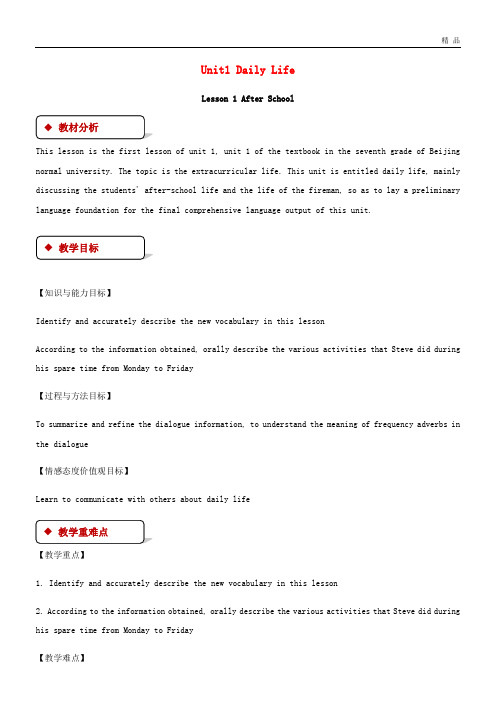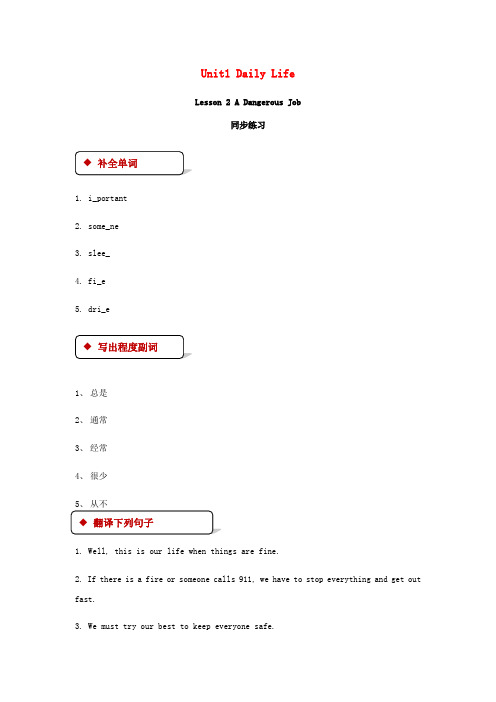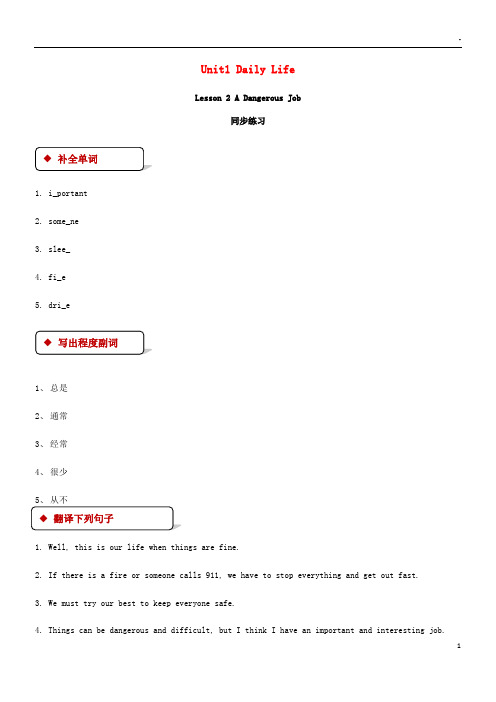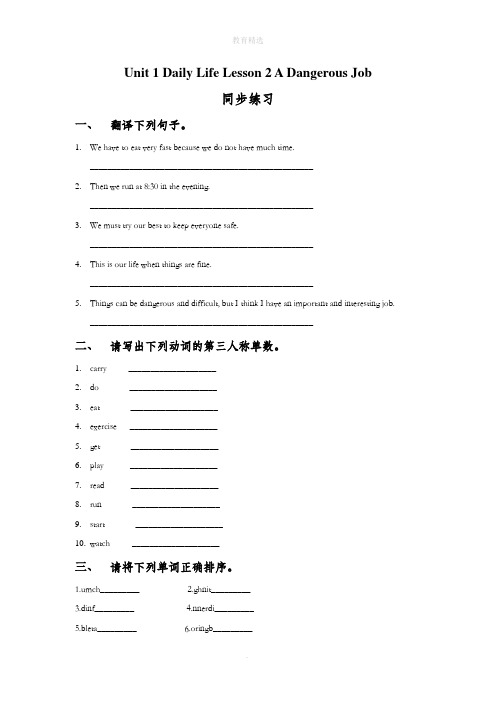【2020】最新七年级英语下册Unit1DailyLife语法篇试题新版北师大版
2020期七年级英语下册 Unit 1 Daily Life Lesson 1 After School教案 (新版)北师大版

Unit1 Daily LifeLesson 1 After SchoolThis lesson is the first lesson of unit 1, unit 1 of the textbook in the seventh grade of Beijing normal university. The topic is the extracurricular life. This unit is entitled daily life, mainly discussing the students' after-school life and the life of the fireman, so as to lay a preliminary language foundation for the final comprehensive language output of this unit.【知识与能力目标】Identify and accurately describe the new vocabulary in this lessonAccording to the information obtained, orally describe the various activities that Steve did during his spare time from Monday to Friday【过程与方法目标】To summarize and refine the dialogue information, to understand the meaning of frequency adverbs in the dialogue【情感态度价值观目标】Learn to communicate with others about daily life【教学重点】1. Identify and accurately describe the new vocabulary in this lesson2. According to the information obtained, orally describe the various activities that Steve did during his spare time from Monday to Friday【教学难点】To summarize and refine the dialogue information, to understand the meaning of frequency adverbs in the dialogueTape recorder, MultimediaStepⅠ Lead-inUse pictures to show the state of daily lifeTalk about the pictures. Introduce the topic of this unit to stimulate students' interest in the topic. Such as brush your teeth, do exercises, do your homework, get upStepⅡ Work in pairs.Tell your partner your routines. Ask the students to answer the question.In the morning, I get up, make my bed and have breakfast.In the evening, I do my homework. …StepⅢ Free talkWhat do you often do in a day?Look at the pictures and discuss: What does he do after school?What are some other after-school activities?Guessing gameLanguage points:1.get upget up 意为“起床”。
2020期七年级英语下册 Unit 1 Daily Life Lesson 1 After School教案 (新版)北师大版

Unit1 Daily LifeLesson 1 After SchoolThis lesson is the first lesson of unit 1, unit 1 of the textbook in the seventh grade of Beijing normal university. The topic is the extracurricular life. This unit is entitled daily life, mainly discussing the students' after-school life and the life of the fireman, so as to lay a preliminary language foundation for the final comprehensive language output of this unit.【知识与能力目标】Identify and accurately describe the new vocabulary in this lessonAccording to the information obtained, orally describe the various activities that Steve did during his spare time from Monday to Friday【过程与方法目标】To summarize and refine the dialogue information, to understand the meaning of frequency adverbs in the dialogue【情感态度价值观目标】Learn to communicate with others about daily life【教学重点】1. Identify and accurately describe the new vocabulary in this lesson2. According to the information obtained, orally describe the various activities that Steve did during his spare time from Monday to Friday【教学难点】To summarize and refine the dialogue information, to understand the meaning of frequency adverbs in the dialogueTape recorder, MultimediaStepⅠ Lead-inUse pictures to show the state of daily lifeTalk about the pictures. Introduce the topic of this unit to stimulate students' interest in the topic. Such as brush your teeth, do exercises, do your homework, get upStepⅡ Work in pairs.Tell your partner your routines. Ask the students to answer the question.In the morning, I get up, make my bed and have breakfast.In the evening, I do my homework. …StepⅢ Free talkWhat do you often do in a day?Look at the pictures and discuss: What does he do after school?What are some other after-school activities?Guessing gameLanguage points:1.get upget up 意为“起床”。
新版北师大版七年级英语下册教案同步练习Unit1DailyLifeLesson2ADangerousJob同步练习

Unit1 Daily LifeLesson 2 A Dangerous Job同步练习1. i_portant2. some_ne3. slee_4. fi_e5. dri_e1、总是2、通常3、经常4、很少5、从不1. Well, this is our life when things are fine.2. If there is a fire or someone calls 911, we have to stop everything and get out fast.3. We must try our best to keep everyone safe.4. Things can be dangerous and difficult, but I think I have an important and interesting job.1、我们会踢足球。
We can2、 I (会游泳)3、 She can draw well.(改为一般疑问句)she well?1、 sleep2、 important3、 rest4、 someone5、 communicate6、 fire7、 drive8、 training答案和解析1.m2.o3.p4.r5. v1、 always2、 usually3、often 4、 seldom5、 never1. 好吧!这就风平浪静时我们的生活。
2. 如果有火灾或有人打911报警,我们必须停止一切活动并迅速出发。
3. 我们应该尽全力去保证每个人的生命安全。
4. 虽然我的工作可能很危险而且艰苦,但我认为我拥有一份重要且有趣的职业。
1、 play football2、 can swim3、 can draw。
北师大版英语七年级下册Unit 1 Daily Life Lesson 2 A Dangerous Job 同步练习1

Unit 1 Daily Life Lesson 2 A Dangerous Job同步练习一、补全单词。
1._est2.i_portant3.some_ne4.slee_5.fire_ighting6.fi_emu_icate 8.dri_e9.tra_ning 10.sa_e二、写出频度副词。
1.总是,一直()2.通常()3.经常()4.有时()5.很少()6.稀少()7.几乎不()8.从不()三、单项选择()1.---How often does your sister surf the Internet?---About______.A. three timeB. three timesC. three time every dayD. three times a day ()2.---When is your father going to Hong Kong?---He is going there ______July 28th.A. onB. atC. inD. to()3. Thank you for ______me find my little cat yesterday.A.helpB. helpsC. helpedD. helping()4.Are you good at ______?A. swimB. swimmingC. to swimD. swam()5. ---Could I use your computer?---____________.A. Yes, I can.B. Yes, you can’tC. Sorry, you can’tD. No can’t.()6. --- ______ does it take you to watch TV?---About forty minutes.A. How longB. How muchC. How oftenD. How many四、我会填。
2019期七年级英语下册 Unit 1 Daily Life Lesson 2 A Dangerous Job同步练习 (新版)北师大版

Unit1 Daily LifeLesson 2 A Dangerous Job同步练习1. i_portant2. some_ne3. slee_4. fi_e5. dri_e1、总是2、通常3、经常4、很少5、从不1. Well, this is our life when things are fine.2. If there is a fire or someone calls 911, we have to stop everything and get out fast.3. We must try our best to keep everyone safe.4. Things can be dangerous and difficult, but I think I have an important and interesting job.1、我们会踢足球。
We can2、 I (会游泳)3、 She can draw well.(改为一般疑问句)she well?1、 sleep2、 important3、 rest4、 someone5、 communicate6、 fire7、 drive8、 training答案和解析1.m2.o3.p4.r5.v1、always2、usually3、often4、seldom5、never1.好吧!这就风平浪静时我们的生活。
2.如果有火灾或有人打911报警,我们必须停止一切活动并迅速出发。
3.我们应该尽全力去保证每个人的生命安全。
4.虽然我的工作可能很危险而且艰苦,但我认为我拥有一份重要且有趣的职业。
1、play football2、can swim3、can draw。
北师大版英语七年级下册Unit 1 Daily Life Lesson 2 A Dangerous Job 同步练习3

Unit 1 Daily Life Lesson 2 A Dangerous Job同步练习一、翻译下列句子。
1.We have to eat very fast because we do not have much time.___________________________________________________2.Then we run at 8:30 in the evening.___________________________________________________3.We must try our best to keep everyone safe.___________________________________________________4.This is our life when things are fine.___________________________________________________5.Things can be dangerous and difficult, but I think I have an important and interesting job.___________________________________________________二、请写出下列动词的第三人称单数。
1.carry ____________________2.do ____________________3.eat ____________________4.exercise ____________________5.get ____________________6.play ____________________7.read ____________________8.run ____________________9.start ____________________10.watch ____________________三、请将下列单词正确排序。
北师大版七年级英语下册同步检测Unit 1 Daily Life Lesson 3
Unit 1 Daily Life Lesson 3Safety First同步练习1. They will have many a during the spring festival.2. If I fthese tasks, we can go to the concert.3. Don't play football on the road. It's very d .4. --- Is it sto cross the road now? --- No, it's very dangerous. You mustn't go until the traffic lights turn green.5. My dream is to t around the world.6. Edison rushed out and carried the boy to (安全).7. I have his phone number in my (地址) book.8. It's (危险) to cross the roads when the lights are red.9. To many people, the meaning of a name is (重要的).10.In my school, students not only work hard, but also take part in all kindsof (活动), such as dancing, drawing, reading and so on.11. --- What does David like?--- He likes basketball, so he often it in theafternoon.A. to play; playingB. playing; to playC. playing; playsD. plays; to play12. Does Amy music?A. likes listening toB. like listeningC. like listening toD. likes to listen to13. --- What your father often on weekends?--- He often watches TV at home.A. do; doesB. does; doesC. do; doD. does; do14. Her father is a teacher. He in a high school.A. teachB. teachsC. teachesD. teaching15. Don't play fire. It's dangerous.A. withB. /C. forD. in16. 我做家庭作业,然后在10点钟上床睡觉.I and at ten o'clock.17. 米莉的储物柜里有什么?What Millie in her locker?18. 这本书太枯燥,我一点儿也不喜欢它.This book is too boring. I like it .19. 我不喜欢早起床.I don't like to .20. 起床后她总是先洗澡.She first after she .The Internet can be a great place for us students to learn, play, chat with our friends, simply relax and so on. But just like the real world, the Internet can be dangerous for us. Here are some suggestions to teach us about using the Internet more safely.*Suggest that we share our Internet experiences with our parents. Enjoy the Internet along with them.*Tell our parents if we feel nervous about anything online, or leave the Internet. *Be sure that we never let out our address, phone number, or other information, including where we study or where we like to play.*Remember that we should never meet net friends alone. It is clear that the net friends may not be who they say they are.*Know which activities online are good for us. If we don't know what activities are good or bad for us, please ask our own parents for help.21. What does the writer try to teachus?A. How to play well on the Internet.B. How to use the Internet safely.C. How to find news from the Internet.D. How to leave the Internet.22. When you have trouble online, you should .A. never tell othersB. ask for help or leave itC. share it with your friendsD. not get online any more23. The writer tells us to .A. keep our information as a secret on the InternetB. make as many net friends as possibleC. refuse online activitiesD. believe every one on the net答案和解析1. activities2. finish3. dangerous4. safe5. travel【解析】根据句意结合本课所学新单词可以比较容易填写出单词.6. safety7. address8. dangerous9. important10. activities【解析】根据中文提示即可填写出正确单词.11. C12. C13. D14. C15. A【解析】11. like doing sth. 为固定短语,意为喜欢做某事;he为第三人称,谓语动词应用单三形式.15. play with fire为固定搭配,意为玩火,做冒险的事.16. do my homework, go to bed17. does; have18. don't,at all19. get up early20. always takes a shower, gets up【解析】16. do homework为固定搭配,意为做作业;go to bed为固定搭配,意为上床睡觉.19. get up early 为固定搭配,意为早起.21. B22. B23. A【解析】21. 阅读全文可知,本篇阅读主要讲述如何安全的使用网络.22. 阅读文中第二点即可得出答案.23. 阅读文中第三点即可得出答案.。
(完整版)北师大版七年级下册英语unit1知识点总结语法点(含答案)
知识图谱Unit 1 Daily Life知识精讲一、必背词汇daily adj. 每日的;日常的routine n. 常规;正常顺序wash v. 洗activity n. 活动drum n. 鼓vi. 击鼓, 作鼓声, 引起兴趣vt. 召集入伍, 逐出, (经过努力)推动, 连续击打never adv. 从不;决不alone adv. 独自;单独seldom adv. 不常;很少always adv. 总是;一直news n. 新闻;消息sometimes adv. 有时;间或finish v. 完成;结束early adv. 提早,提前adj. 早期的;早到的match n. 比赛;竞赛;火柴v. 匹配note n. 笔记;记录;便条try v. 试;试图n. 尝试;努力best n. 最好的事物(或人)adj. adv.最好的keep v. (使)保持;处于safety n.安全;中卫adj.保障安全的bicycle n. 自行车v. 骑自行车storm n. 暴风雨v. 猛攻, 捣毁, 起风暴travel v. 旅行n. 旅行,旅游online adv. 在线地adj. 在线的联网的during prep. 在……期间内bad adj. 坏的;不好的lightning n. 闪电adj. 闪电般的vi. 打闪stay v. 停留;待phone n. 电话v. 打电话mean v. 意思是point n. 观点;尖端,点v. 指向address n. 地址;通信处;演说;称呼smoke v. 吸烟;抽烟n. 烟bath n. 洗澡;洗浴away adv. 离开(某距离);去别处minute n. 分钟;一会儿need v. 需要more adv. 更;更多star n. 恒星;星;明星dress v. 穿衣服n. 连衣裙二、重点词汇1. alone adjective , adverb /əˈləʊn/without other people单独(的),独自(的);孤独的(地),无伴的(地)1). He likes being alone in the house.他喜欢自己一个人呆在家里。
七年级英语下册Unit1DailyLife词汇篇试题新版北师大版
Unit One(词汇篇)____________________________________________________________________________________________________________________________________________________________________学生可以熟练掌握词汇、短语和句型。
一、重点单词动词:practice drive , communicate , try , eep, wal, travel, stay, mean, need, dress 名词:routine,activity, news, match, cinema, fire, training, rest, safety,bicycle,storm, id, point, address形容词:daily, important, dangerous, difficult, easy, interesting, safe, best, bad副词:never, alone, seldom, always, sometimes, later, online, away二、短语1.get dressed 穿好衣服2. mae one’s bed 铺床3.tae a shower 洗淋浴4. brush one’s teeth 刷牙5.wash one’s face 洗脸6. play sports 做运动7.watch the evening news 看晚间新闻 8. listen to pop music 听流行音乐 9.go running 去跑步10. go to the cinema 去看电影11.tidy one’s room 整理房间 12.get some rest 得到休息13.go for sills training 进行技能训练 14. ride a bicycle 骑自行车 15.stay at home 待在家里16. tal with friends 和朋友聊天 17.wal in a storm 在暴风雨中行走 18. play with fire 玩火19.meet an Internet friend 见网友 20. have to do sth.不得不做某事 21. safety tips 安全建议22. have a point 有道理 23.stay away from 远离三、句型1.----What do you do after school? 你放学后做什么?----I usually read boos. 我通常看书。
北师大版英语七年级下册Unit 1 Daily Life Lesson 1 After School 同步练习1
Unit 1 Daily Life Lesson 1 After School同步练习一、补全单词。
1._aily2.r_utine3.too_h4._ace5.after-s_hool6.a_tivity7.dru_ 8.nev_r9.sel_om 10.cine_a二、单词闯关1. 和(conj. )______________2. 读书(v. )______________3. 唱歌(v. )______________4. 步行(v. )______________5. 做饭(v. )______________6. 画画(v. )______________7. 天气(n. )______________8. 寒冷的(adj. )______________9. 炎热的(adj. )______________10. 春天(n. )_____________三、用所给词的适当形式填空。
1. Running in the morning ______ (be) Tom’s favorite sport.2. —Do you ______ (read) English every day?—Yes, I do.3. ______ (do) you like dancing with friends?4. Daming likes ______ (music) very much.5. They like ______ (sing) and playing computer games.四、同义句。
1.There are five bananas in his box._______ ________ five bananas in the box.2. We have a good time in school.We ________ ________ in school.3. I get to the library at six.I _________ ________ the library at six.4. There is a pay phone in the neighborhood.There’s a pay phone ________ _________.5. My aunt buys hamburgers for five dollars.My aunt ________ five dollars ________ hamburgers.五、选择填空。
- 1、下载文档前请自行甄别文档内容的完整性,平台不提供额外的编辑、内容补充、找答案等附加服务。
- 2、"仅部分预览"的文档,不可在线预览部分如存在完整性等问题,可反馈申请退款(可完整预览的文档不适用该条件!)。
- 3、如文档侵犯您的权益,请联系客服反馈,我们会尽快为您处理(人工客服工作时间:9:00-18:30)。
1 / 14 【2020】最新七年级英语下册Unit1DailyLife语法篇试题新版北师大版
编 辑:__________________ 时 间:__________________
教学资料范本 2 / 14
__________________________________________________________________________________ __________________________________________________________________________________ 重点掌握一般现在时的用法 重点语法: 一、一般现在时的用法:A.现在经常性的动作或状态B.客观事实和真理 一般现在时表示习惯性、经常性、反复性的动作或存在的状态.。“习惯性、经常性、反复性”是一般现在时的三大特性,它不表示特定时间内发生的事.。 二、时间状语标志词:always,usually,often, sometimes, never,every day /week /month/year/…
三、一般现在时的构成:Be动词构成的一般现在时;实义动词构成的一般现在时 四、谈谈“主语为三单,其后动词s添” 在一般现在时中,当主语为第三人称单数时,谓语动词要用第三人称单数形式.。可以简单叙述为“主语为三单,其后动词s添”.。何谓第三人称单数?用一句话概括就是“非你、非我、非复数”,
如he, she, it, my father, my mother, my sister, our English teacher, Tom, Mike, Liu Jia, China, my book, etc. 五、动词第三人称单数变化规则 动词第三人称变化的规则与可数名词复数变化的规则相同.。 规则一、一般在词尾加-s.。 3 / 14
如:looks, puts. reads, sees, skis等.。 规则二、以-o, -s, -x, -sh, -ch结尾的加-es.。
如:goes, does, misses, passes, mixes, fixes, pushes, wishes, watches, teaches,等.。 规则三、以辅音字母加y结尾的,变y为i,再加-es.。注意一定是辅音字母加y才变,若是元音字母加y,则直接加-s.。 如:fly → flies, try → tries, fry → fries, copy → copies, buy → buys,
enjoy → enjoys, play → plays, say → says, pay → pays 六、一般现在时的句子转换 (1)当句子中有be动词或情态动词时,则把be动词或情态动词(can,could等等)提到主语的前面变成一般疑问句;在be动词或情态动词后面加not变成否定句.例: ①陈述句:She is a student. 一般疑问句→ Is she a student? 否定句→ She is not a student. ②陈述句:I can swim. 一般疑问句→ Can you swim? 否定句→ I can not swim. (2)当句子中即没有be动词,也没有情态动词时,则在主语前加助动词do (you,以及复数), does(单数she,he,it)变成一般疑问句;在主语后谓语动词前加助动词don’t(I,you,以及复数), doesn’t(单数she,he,it)变成否定句,助动词后的动词要变成动词原形.。例: ①陈述句:We get up at 7:00 every morning. 一般疑问句→Do you get up at 7:00 every morning? 否定句→We don’t get up at 7:00 every morning. ②陈述句:She has a little brother. 一般疑问句→ Does she have a little brother? 否定句→ She doesn’t have a little brother. 1._______________you often travel for car? 4 / 14
A.Do B.Are C.Is D.Does 2.___________Mary go online everyday? A.Do B.Are C.Is D.Does 3.--Do over 50% of fire start in bedroom? ---__________________. A.Yes,they are B.No,they aren’t C.No,they don’t D.Yes,they start 4.My sister________her homework at home because she does it at school. A.isn’t do B.doesn’t do C.does D.do 5.How________your brother___________the Internet to make phone? A.do; use B.does; use C.does; uses D.does; using 解析: 1.travel是动词,所以我们必须用助动词来构成一般疑问句,you是第二人称,所以用do.。 2.Mary 是第三人称单数,借助助动词does来构成一般疑问句.。 3.问句中是用助动词do来构成疑问句的,所以用什么问,就用什么答,故选C.。 4.做作业是动词,所以借助助动词do或者does,根据because后面的内容可知选B.。 5.use是动词,所以我们必须用助动词来构成一般疑问句,your brother是第三人称单数,所以用does,在借助助动词后,原来的动词要还原.。故选B.。 答案: 1. A 2.D 3.C 4. B 5.B 基础演练 一、写出下列动词第三人称单数的变化形式.。
6.teach______ 7.write________ 8.take_______ 9.study______ 10.watch_______ 5 / 14
11.fly_______ 12.play________ 13.run_______ 14. do_______ 15.like_________ 16.carry_____ 17.guess_______ 18.finish______ 19.snow______ 20.wash_______ 二、用括号中所给词的适当形式填空.。 1.The buses ______ (use) a lot of oil. 2.Each of us ______ (have) strong points and weak points. 3.My daughter ___ (watch) TV every day. Sometimes she __(see) a film on Sunday. 4.Li Wei ________ (have) a daughter. She stays in a nursery. 5.Our family _________ (be) a happy one. 6.Her mother ___________ (teach) English at a middle school. 7.Jack often ___________ (listen) to the radio. 8.He ________ (say) that Prof. Li is tired. 三、从括号中选择合适的词语填空.。 1.We often play football _____________(after school/after-school). 2.I often to ____________(watch/look/see) the football match in the evening. 3.My father likes to_____________(see/look/watch/read)newspaper every morning. 4.She has some free time ,so she plays the piano___________(sometimes/always). 5.______________(How often/How many)do you go to clubs after school. 巩固提高 四、用所给词的正确形式填空.。 1.My brother________(tidy) his room every morning. 2.They________(clean) the classroom after school every day. 3.Mike ___________(not like )the movie because he thinks it is too boring. 4.Mary sometimes__________(have) lunch at school. 6 / 14
5.We usually __________(go) to work by bus. 6.My father often __________(watch) football matches on TV. 五、句型转换.。 1.Jim is always late for school.(对画线部分提问) ________ ________ ________ Jim late for school? 2.I often read books in our school library after school.(改为一般疑问句) ________ ________ ________ read books in your school library after school? 3.I watch a football match on TV every day.(对画线部分提问) _________ ________ ________ you watch a football match on TV? 4.I play sports with my friends after school.(对画线部分提问) ________ ________ ________ ________with your friends after school? 5.I watch the evening news at 7:00(改为否定句) I ________ ________the evening news at 7:00. 答案:
